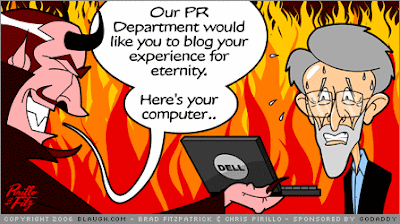
Social media most undoubtedly has its benefits and its drawbacks. Especially since brands and marketers are still experimenting with the concept.
I've reprinted an article and analysis from Bernhard Warner with a slide share presentation from Social Media Influence's editorial and social media training partner, Custom Communication, who has gone back through six years of social media and compiled a visual narrative of company misadventures with bloggers, tweeters and other social media voices. [Still images added by me].
Since 2004 they’ve identified 37 notable instances where companies have been caught short by social media protests and complaints or where they’ve shot themselves in the foot with dumb marketing.
A snapshot of the history:
Given the explosion in social media participation it’s not surprising to see a steady year-on-year increase in social media screw ups but while 2006 saw 7 major incidents the 10 recorded so far this year suggests that corporate communicators and marketers are becoming more savvy in how they engage and look after their online reputation.
The numbers are trending nicely for social media. As the IAB UK points out this week, the surprising surge in online advertising through the first half of 2010 can be attributed in part to more money pouring into social media marketing. There’s another social media figure on the rise, and it’s not quite so inspiring.
According to the new piece of research by Custom Communication, “Social Media Screw Ups – A Short History,” along with the surge in social media investment comes a surge in social media screw-ups by major corporations using these channels to reach the public. 2010 is on pace to see more reputation-bruising social media gaffes than in any previous year. Haven’t they learned anything from the Kryptonite lock fiasco of 2004? Apparently not.
In reviewing the findings, it’s become clear: many of the mistakes are being repeated time and again. We list here the most oft-repeated missteps and misconceptions that lead to trouble.

above: kryptonite lock could be broken with a pen, image courtesy of wired.com
* Underestimating influence/impact of your social media critics. Kryptonite is the business school case study here, but loads of brands since – from Target telling the blogosphere they don’t rate to Nestle telling off eco Facebook protesters – have failed to understand that bloggers/Tweeters and Facebook protesters may not be The Guardian or New York Times, but they do hold plenty of weight.

above: bloggers bitch-slapped L'oreal for using false eyelashes on Penelope Cruz to sell mascara, image from L'oreal
* Giving the online community flashy marketing message when they just want simple, straightforward detail. These days, companies can get into big trouble for issuing fictitious glowing reviews or trotting out seemingly genuine testimonials by paid actors. Even before these consumer protections were put into place, L’Oreal paid a higher price – it got burned by vigilant bloggers.

above: Dell Hell, courtesy of blaugh.com
* Culture of unresponsive/uncaring customer service fuels recurring gripes, becomes PR headache. Dell learned the hard way that Jeff Jarvis’ customer service gripes were not an isolated issue; a massive backlash was brewing. It just took one well-connected critic to put his finger on it and the avalanche ensued.

above: the Diet Coke and Mentos experiments could not be hushed, image from reputation online
* Failing to understand the Coke credo: “our consumers control our brand.” Coca-Cola tried to stifle conversation around the combustible combo of Diet Coke + Mentos. Later, it would acknowledge, you cannot hope to muzzle what everyone is talking about.

above: the Chevy Tahoe commercial competition, image from Chevy.com
* Petition the public for crowdsourced ideas, only to be caught out when they have something nasty to say. Crowdsourcing is in vogue these days, giving loyal fans a chance to name a new product or devise a new softdrink formula. But as Chevrolet learned with its Tahoe SUV, be prepared to get from the public more than a clever new slogan.


above: the controversial Vodaphone tweet and reaction from Vodaphone
* Asleep at the wheel: giving junior employees full reign of the channels and providing them with little direction. What could go wrong? Where to start here? Last year, the epic #fail was engineered by Habitat which gave an “overenthusiastic intern” the keys to the Twitter feed. The result? Famously tweeting sale promotions by piggy-backing on the trending Iran election hashtags. More recently, the Vodafone UK Twitter feed was hijacked by a rogue employee who let fly with the odd homophobic Tweet.

above: Wal-Marting Across America, image from walmart.com
* Attempts at feel-good social media washing won’t come back to bite. Wal-Mart took the most heat here when a folksy, it-will-be-blogged “Wal-Marting Across America” journey emerged just as it was getting pressured elsewhere for its checkered labor practices. All goodwill was lost when it was revealed Wal-Mart was funding the feel-good road trip.

above: negative comments on Nestle's Facebook Fan Page
* Facebook is a forum for fans and “Likes.” Burger King, Nestle, and BP, to name just a few have seen their Facebook pages overwhelmed by critics who want to expose dodgy company practice. Greenpeace has had great success mobilising its followers in a series of corporate Facebook pressure campaigns. BK quickly caved to the demands to cheers. Nestle, on the other hand, shouted back, inviting more opposition.
The biggest culprits – plain dumb marketing, officious customer service and asleep-at-the-wheel moments in monitoring online reputation – are alive and well and triggering protests from the general public. For all the fresh money pouring into social media, we would expect the number of screw-ups to rise before companies really get the message that social media investment means more than crafting a slick campaign. It means two-way dialogue, transparency and, yes, learning from your mistakes.
sources: SMI, Reputation Online, Custom Communication










Tidak ada komentar:
Posting Komentar